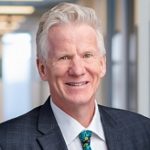 By Nick van Terheyden aka Dr Nick, Principal, ECG Management Consulting
By Nick van Terheyden aka Dr Nick, Principal, ECG Management Consulting
Twitter: @drnic1
Host of Healthcare Upside Down – #HCupsidedown
“Houston, we have a problem here…” Those six words are burned into the memory of many people around the world.
An explosion aboard Apollo 13, a crewed spacecraft bound for the moon, marked the start of one of the greatest rescue missions in human exploration. When the three crewmembers—Jim Lovell, Jack Swigert, and Fred Haise—returned safely to earth, they were hailed as heroes for their bravery and resilience in the face of adversity.
Episode NOW on Demand
But the astronauts owed their lives to the entire NASA team that worked tirelessly to develop a plan to save them. The team on the ground worked around the clock to create a plan to conserve power and oxygen, develop a new flight trajectory, and solve an array of technical challenges.
The story of the Apollo 13 mission is a testament to the power of teamwork. Astronauts, engineers, and scientists worked together seamlessly to overcome unprecedented obstacles and achieve an incredibly difficult goal. The mission demonstrated that, with the right mindset and a shared sense of purpose, anything is possible.
Medicine requires the same teamwork to bring a unified sense of purpose and the best possible experiences to every patient who enters a health system seeking compassion and care.
Tim Babineau, MD, knows a thing or two about facing unprecedented challenges. For 10 years, Dr. Babineau served as the president and CEO of Lifespan Health System in Rhode Island, where he transformed patient access, drove major service line expansions, and led the system’s response to the COVID-19 pandemic. On this episode he talks about the mindset he brought to his years as a practicing surgeon and as an executive. Below are a few excerpts.
Good patient care starts with good provider care.
“One of my priorities that proved to be successful is to focus on the people who come to work every day. If you take care of your people, they’ll take good care of your patients. And while patient care is our top priority, as it should be, what I learned as the CEO is that unless you invest in your people, you’re going to struggle in the market, you’re going to struggle to grow, and you’re going to struggle to provide excellent patient care.”
Doctors need teams to succeed.
“I had the privilege of being a busy surgeon in Boston for 20-plus years, and I learned how important it is for all members of the team to contribute to patient care. Medicine is a team sport. It’s how I practiced my whole career when I was a surgeon. I was only as good as my team—the anesthesiologist, the pre-op care, the post-op care, dietary, and laundry. It’s something I’ve always believed in. Even when I was CEO, I approached my job as a physician. So the decisions I made—the resource allocation, the hard decisions—it was really through the lens of a practicing physician. I think that served the organization well, and I think it served me well.”
Leadership is a team effort.
“When I became CEO, I surrounded myself with people who knew a lot more than I did in areas that were not my [strength]. I made sure I had a really good CFO and a really good CIO. And when I look around the country at top-notch organizations that are led by nonclinical administrators, they tend to surround themselves with expert clinicians. They recognize that they haven’t been in the OR at 3 a.m., so they’ve got some well-respected, seasoned clinicians in their inner circle, and they listen to them very closely. If you look at organizations that struggle, it’s sometimes because the nonclinical administrators don’t recognize how important it is to listen to clinicians.”
This article was originally published on the ECG Management Consulting blog and is republished here with permission.
About the Show
The US spends more on healthcare per capita than any other country on the planet. So why don’t we have superior outcomes? Why haven’t the principles of capitalism prevailed? And why do American consumers have so much trouble accessing and paying for healthcare? Dive into these and other issues on Healthcare Upside/Down with ECG principal Dr. Nick van Terheyden and guest panelists as they discuss the upsides and downsides of healthcare in the US, and how to make the system work for everyone.
Tune in weekdays at 9am, 5pm, and 1am ET.
Join the conversation on Twitter at #HCupsidedown.
